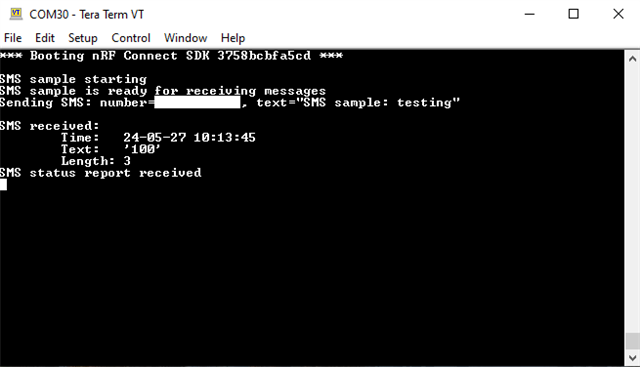Hello all smart people.
Currently I am working with SMS sample and I want to toggle LED with pwm after receiving message, but I can not get sms on the "live" only after restart I see that message is received on terminal.
What did I wrong or how to get sms on controller live time?
Thank you, fizz drink on me
/*
* Copyright (c) 2021 Nordic Semiconductor ASA
*
* SPDX-License-Identifier: LicenseRef-Nordic-5-Clause
*/
#include <stdio.h>
#include <zephyr/kernel.h>
#include <string.h>
#include <modem/sms.h>
#include <modem/nrf_modem_lib.h>
#include <modem/lte_lc.h>
#include <zephyr/drivers/gpio.h>
#include <zephyr/drivers/pwm.h>
static struct k_work sms_workk;
static const struct pwm_dt_spec pwm_led0 = PWM_DT_SPEC_GET(DT_ALIAS(pwm_led0));
/* 1000 msec = 1 sec */
#define SLEEP_TIME_MS 2500
/* The devicetree node identifier for the "led0" alias. */
#define LED0_NODE DT_ALIAS(led0)
/*
* A build error on this line means your board is unsupported.
* See the sample documentation for information on how to fix this.
*/
static const struct gpio_dt_spec led = GPIO_DT_SPEC_GET(LED0_NODE, gpios);
static void sms_callback(struct sms_data *const data, void *context)
{
if (data == NULL) {
printk("%s with NULL data\n", __func__);
return;
}
if (data->type == SMS_TYPE_DELIVER) {
gpio_pin_toggle_dt(&led);//
/* When SMS message is received, print information */
struct sms_deliver_header *header = &data->header.deliver;
printk("\nSMS received:\n");
printk("\tTime: %02d-%02d-%02d %02d:%02d:%02d\n",
header->time.year,
header->time.month,
header->time.day,
header->time.hour,
header->time.minute,
header->time.second);
printk("\tText: '%s'\n", data->payload);
printk("\tLength: %d\n", data->payload_len);
if (header->app_port.present) {
printk("\tApplication port addressing scheme: dest_port=%d, src_port=%d\n",
header->app_port.dest_port,
header->app_port.src_port);
}
if (header->concatenated.present) {
printk("\tConcatenated short message: ref_number=%d, msg %d/%d\n",
header->concatenated.ref_number,
header->concatenated.seq_number,
header->concatenated.total_msgs);
}
} else if (data->type == SMS_TYPE_STATUS_REPORT) {
printk("SMS status report received\n");
} else {
printk("SMS protocol message with unknown type received\n");
}
}
int main(void)
{
int handle = 0;
int ret = 0;
uint32_t period = 1000000U;
uint32_t pulse_width = period/100*100;
uint32_t dummy =0;
printk("\nSMS sample starting\n");
ret = nrf_modem_lib_init();
if (ret) {
printk("Modem library initialization failed, error: %d\n", ret);
return 0;
}
ret = lte_lc_connect();
if (ret) {
printk("Lte_lc failed to initialize and connect, err %d", ret);
return 0;
}
handle = sms_register_listener(sms_callback, NULL);
if (handle) {
printk("sms_register_listener returned err: %d\n", handle);
return 0;
}
printk("SMS sample is ready for receiving messages\n");
/* Sending is done to the phone number specified in the configuration,
* or if it's left empty, an information text is printed.
*/
if (strcmp(CONFIG_SMS_SEND_PHONE_NUMBER, "")) {
printk("Sending SMS: number=%s, text=\"SMS sample: testing\"\n",
CONFIG_SMS_SEND_PHONE_NUMBER);
ret = sms_send_text(CONFIG_SMS_SEND_PHONE_NUMBER, "SMS sample: testing");
if (ret) {
printk("Sending SMS failed with error: %d\n", ret);
}
} else {
printk("\nSMS sending is skipped but receiving will still work.\n"
"If you wish to send SMS, please configure CONFIG_SMS_SEND_PHONE_NUMBER\n");
}
if (!gpio_is_ready_dt(&led)) {
return 0;
}
ret = gpio_pin_configure_dt(&led, GPIO_OUTPUT_ACTIVE);
if (ret < 0) {
return 0;
}
/* if (!pwm_is_ready_dt(&pwm_led0)) {
printk("Error: PWM device %s is not ready\n",
pwm_led0.dev->name);
return 0;
}
ret = pwm_set_dt(&pwm_led0, period, pulse_width);
if (ret) {
printk("Error %d: failed to set pulse width\n", ret);
return 0;
} */
for(;;)
{
//ret = pwm_set_pulse_dt(&pwm_led0, pulse_width);
k_msleep(SLEEP_TIME_MS);
dummy++;
}
/* In our application, we should unregister SMS in some conditions with:
* sms_unregister_listener(handle);
* However, this sample will continue to be registered for
* received SMS messages and they can be seen in serial port log.
*/
return 0;
}



